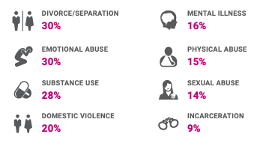 What happens in an individual’s childhood plays a large part in the type of person they become, how they view the world, the opportunities they have and how they raise their own children.
What happens in an individual’s childhood plays a large part in the type of person they become, how they view the world, the opportunities they have and how they raise their own children.
Research around Adverse Childhood Experiences (ACEs) gives us the science to understand why. With ACEs research, we better understand the long-term effects of childhood trauma. This knowledge allows us the opportunity to not only help those that have experienced ACEs but also prevent other children from experiencing them.
What are Adverse Childhood Experiences (ACEs)?
Adverse Childhood Experiences are traumatic events that occur in a child’s life prior to the age of 18. This adversity can harm a child’s brain development and can result in long-term negative health and social outcomes.
ACEs include emotional, physical and sexual abuse; emotional and physical neglect; domestic violence; substance misuse and mental illness of someone in the household; being separated from parents, including incarceration and divorce; food insecurity; and homelessness. These stressful situations cause a child’s brain to go into overload. When compounded, these experiences make it hard for kids to self-regulate and recover.
What is an ACE score?
An ACE score is the sum of an individual’s adverse childhood experiences and ranges from zero to 10. For example, James is 25-years-old. His parents were divorced at an early age because his father drank excessively was physically abusive towards James.
James would have an ACE score of three. Divorced parents (1), physical abuse (1) and substance misuse in the household (1).
Why is James’s ACE score important?
What does an ACE score tell us?
Simply put, the more ACEs a child experiences the more likely they will experience negative health and well-being outcomes. If James had experienced homelessness as a child, further increasing his ACE score, he would be more at risk of adopting a health risk behavior (such as alcohol and drug abuse) or experiencing depression and anxiety.
A higher ACE score doesn’t mean that an individual will experience these things, but there is an increased risk. And there are things that adults and communities can do to help prevent ACEs.
Why is preventing ACEs important?
The good news is that ACEs are preventable. Ensuring that children and their caregivers have a framework of protective factors (which will be the topic of another Policy Forum edition – stay tuned!) reduces the risk of experiencing ACEs.
In addition to the individual costs of ACEs, there are costs to the greater community. The costs of drug and alcohol misuse, unintended pregnancies, depression, anxiety, suicide span far beyond the individuals and the families that are affected.
Currently, there is state and federal funding for programs that help prevent ACEs. A federal program, Maternal Infant and Early Childhood Home Visiting (MIECHV) assists states in paying for trained professionals to assist expectant and young moms navigate the first years of a child’s life.
At a more local level,
At a more local level, South Carolina funds several different models of home visiting programs including Nurse Family Partnership, Healthy Families America and Parents as Teachers. In addition, and with the support of state funding, federal funding through the South Carolina Department of Social Services and The Duke Endowment, Children’s Trust funds the Strengthening Families Program and the Positive Parenting Program (Triple P). They are different program models where parents learn positive parenting skills, and parents and children learn resiliency and other important skills that help protect against potential ACEs.
ACEs in South Carolina
In a survey of ACEs in South Carolina, 62 percent of adults reported one ACE as a child, 22 percent reported two or more ACES and 16% reported four or more ACEs.
Within this survey, the breakdown of ACE types is:

Within the same group of those surveyed, 76 percent of current smokers reported ACEs and 79 percent of adults that had depressive disorders reported ACEs.
ACEs at the Statehouse
In 2018, 24 state legislators were interviewed about their thoughts on ACEs. The brief found:
“A majority of legislators highlighted the impact of ACEs on early childhood development, behavior, and ability to succeed in school. They had a clear understanding of the link between ACEs and mental health outcomes such as depression or suicide but were uncertain about the known link between ACEs and chronic health conditions such as obesity or heart disease.”
There was also consensus among those interviewed that the state government played an important role in supporting ACE prevention community-state partnerships.
What can you do?
We invite you to learn more. Children’s Trust offers trainings on ACEs where you will learn the impact of ACEs on early childhood brain development, health and well-being, the original ACE study and South Carolina ACE data, as well as strategies to empower communities to prevent ACEs.



